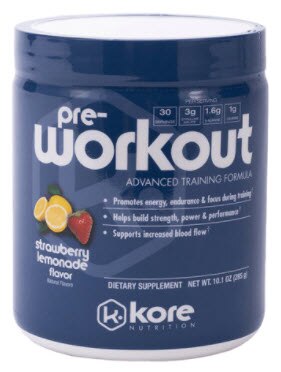Pre-workout supplements are designed to give exercisers an extra jolt of energy before their training sessions, giving them the energy to simply start their workouts, to power through more sets at higher intensities, or to exercise for a longer durations. Simply put, pre-workouts are taken to prime the body and mind to increase the effectiveness of your workout. Pre-workout supplements fall into two categories: those that contain stimulants such as caffeine, guarana and the alkaloid theacrine, and those that do not.
Why do preworkouts contain stimulants?
Caffeine is known to sharpen focus, increase alertness and even increase tolerance to pain caused by exercise, all of which can help you to get through a tough workout and increase performance. It also gives you quick energy that is beneficial for both endurance workouts and shorter, higher-intensity ones. However, if you are sensitive to caffeine, if it makes you jittery or anxious, or if it prevents you from sleeping at night, look for a stimulant-free pre-workout, or get your pre-workout energy from food instead.
“When choosing a pre-workout supplement, you have to look at the caffeine level and decide what you are comfortable with,” says Kroger culinary dietitian Ashley Martinez, MFN, RDN, LD, NASM-CPT. “And, you have to take into account how much caffeine you are already consuming.”
Martinez suggests that those already drinking one to two cups of coffee per day, and women with lower body weights, choose a pre-workout that contains around 125 milligrams of caffeine, or, if they are more comfortable without it, none at all. Kore Pre-Workout is good option with moderate levels of caffeine. However, many pre-workouts can contain upwards of 300 milligrams of caffeine, which, Martinez says, is quite a bit taken in addition to other caffeine sources.
“Anyone who takes a pre-workout with a large amount of caffeine should be someone who consumes caffeine regularly,” she says. “If not, they will really be feeling the juice.”
What are the other ingredients in preworkout supplements?
In addition to stimulants, pre-workout supplements typically contain varying blends of quick-absorbing carbohydrates, essential amino acids, the branched-chain amino acids leucine, isoleucine and valine, the non-essential amino acid beta-alanine, antioxidants and B vitamins, all of which may help boost energy, reduce fatigue, increase muscular endurance and speed muscle recovery.†
Pre-workouts may also contain ingredients like nitrosigine, arginine and citrulline, which increase nitric oxide production and therefore increase blood flow to the muscles. “Choose a pre-workout with ingredients that support your fitness goals,” Martinez says. “BCAAs will help with muscle support and recovery in shorter, more intense workouts, while nitric oxide-boosters help get more oxygen to the muscles to support longer, more endurance-based workouts.”†
Should you use a preworkout?
The decision to use a pre-workout is very personal, as no one approach works for everyone. Many people simply have a snack, like a peanut butter sandwich, a bowl of oatmeal or a piece of fruit, before exercising. Others prefer to work out on a completely empty stomach, or even at the end of a 12 to 16-hour fast to optimize their ability to burn fat. But, many also swear by a pre-workout supplement, claiming it boosts their energy and endurance and allows them to more quickly see the results of their training.†
However, it’s important to note that no pre-workout is going to make you bigger, stronger or faster. But, pre-workouts can help you power through a tough training session, and if you do that repeatedly, bigger, stronger and faster may follow. Still, it’s important to start slowly, as deviating from your normal routine can be disruptive for the system.
“Ask yourself, ‘Is this a drastic change?’” suggests Martinez. “It’s important not to do something that is too off track from what we are used to, because that’s when we run into issues. Try asking yourself, in the moment, ‘Do I need fuel now or not?’”
Are preworkouts safe?
The safety of a pre-workout depends entirely on its ingredients and the effect they have on you, so be sure to read labels carefully and honestly assess how you feel. If a product makes you feel jittery, or if it causes nausea or a headache or keeps you from sleeping at night, it probably isn’t for you. Those who have heart conditions or high blood pressure, or who have been instructed to limit caffeine consumption, should consult their doctors before consuming any product that contains stimulants.
“Make sure you know what you are consuming,” Martinez says. “If you have questions, take them to an expert, or contact the brand.”
When should you take a preworkout?
Most nutritionists recommend eating a full meal three to four hours before exercising, then having a smaller meal rich in carbohydrates and protein 30 to 60 minutes prior. In many cases, a protein bar, some Greek yogurt with nuts and fruit, or a banana with peanut butter will suffice. Or, you may use a pre-workout instead, or in addition to, that smaller meal. Taking a pre-workout with food may also help reduce some of the unwelcome side effects associated with pre-workouts, such as nausea, headache or jitters.
“The difference is that you get more in food than you do from a pre-workout,” Martinez explains. “With food, you get calories that can be utilized for fuel, and food is better absorbed and better utilized. Supplements are exactly that: supplemental. So if your banana went bad or you forgot your food, and your supplement is in the bag, go for it. But I always recommend food first, supplements second.”
Whatever you decide to consume before your workout, getting it in 30 to 60 minutes before you train ensures all of the ingredients have the necessary time to reach peak levels in your blood. Many gym-goers make the mistake of slamming their pre-workout – or that PB&J – in the car or the locker room right before they hit the gym floor, which means they will be well into their workout before it has a chance to take effect.
Should you take preworkout supplements before every workout?
In a word, no. Because many pre-workouts contain caffeine, and because the body develops a tolerance to caffeine. If you use it every time you hit the gym or the track or the field, you’ll continually have to up the amount to get the same boost of energy. For this reason, many nutritionists and coaches recommend saving the pre-workout for your most important or most intense workouts, or for days when you know you’ll be going for a PR.
“Because you can develop a tolerance, I would make sure you use pre-workout in a moderate amount, and perhaps three times a week, but not daily,” Martinez says. “But of course, it all depends on your personal level of tolerance, your nutrition and metabolism, and your exercise goals.”
†These statements have not been approved by the Food and Drug Administration. These products are not intended to diagnose, treat, cure or prevent disease.


